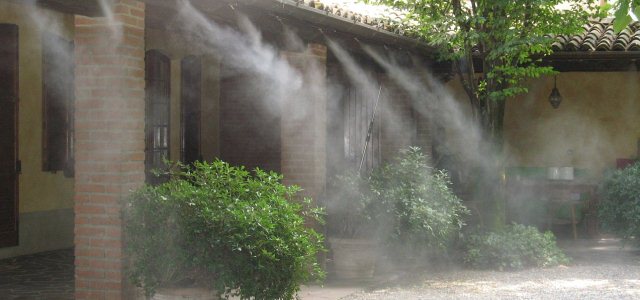Miért hasznos?
• A nyári napokon elviselhetővé, kellemessé varázsolja környezetünket, távoltartja a rovarokat.
• Az állattartásban a hőstressz kialakulása elkerülhető.
• A növénytermesztésnél és állattartásnál a szükséges relatív páratartalom pontosan szabályozható.
• Zöldség-gyümölcs tárolásánál a páratartalom megfelelő szabályozásával frissen tartható.
• Az ipar számos területén a por lekötése könnyen megvalósítható.
• Kiválóan alkalmas a kellemetlen szagok megszüntetésére.
• A fertőtlenítés egyszerűen és hatékonyan megvalósítható a mezőgazdaság és az ipar számos területén.
• Üzemeltetése rendkívül olcsó.
• Nincs a rendszerben a környezetre káros anyag, csak víz.
Hogyan működik?
A FIXNET COOLING rendszer fizikai törvényszerűségen alapul:
a párolgás hőelvonással jár.
A párolgást a térbe magasnyomáson kijuttatott víz segítségével érjük el (70-100 bar). A speciális fúvókák segítségével 5-15 μ nagyságú vízcseppek jutnak a környezetbe, amelyek nagyon rövid idő alatt elpárolognak, ezzel hőt vonnak el a környezetből, így a levegő hőmérséklete csökken. Ez a hőmérsékletcsökkenés akár 5-10 °C is lehet.
Hogyan telepíthető?
A FIX NET Kft. szakemberei előzetes egyeztetés után felmérik a helyszínt, majd ezt követően ajánlatot tesznek a rendszer telepítésére. Amennyiben az ajánlat elfogadásra kerül a rendszer telepítése 2-3 héten belül megtörténik.











